Unit 2 Understanding each other Grammar and usage Page 20-21 Overview of relative clauses课件(共28张PPT
文档属性
| 名称 | Unit 2 Understanding each other Grammar and usage Page 20-21 Overview of relative clauses课件(共28张PPT |
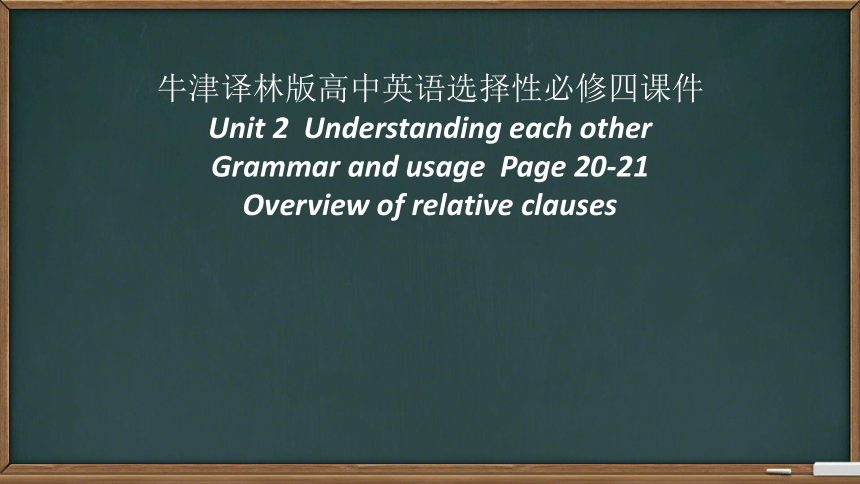
|
|
| 格式 | pptx | ||
| 文件大小 | 275.8KB | ||
| 资源类型 | 教案 | ||
| 版本资源 | 牛津译林版(2019) | ||
| 科目 | 英语 | ||
| 更新时间 | 2025-06-21 00:00:00 | ||
图片预览

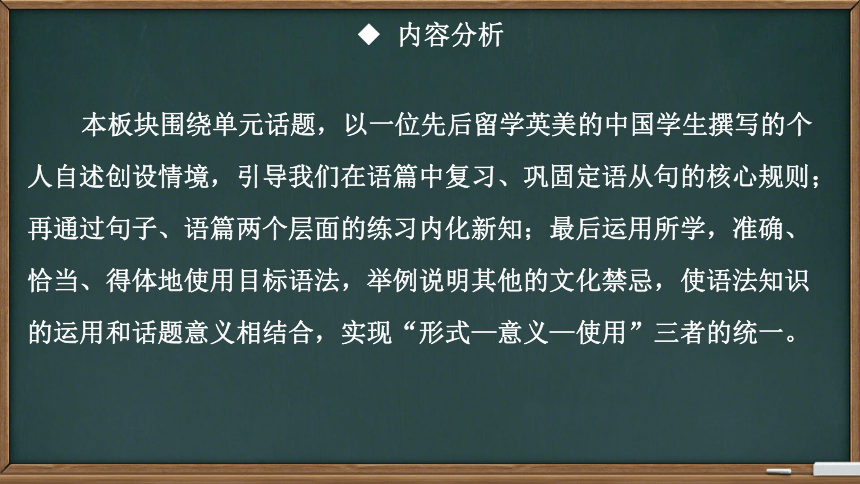
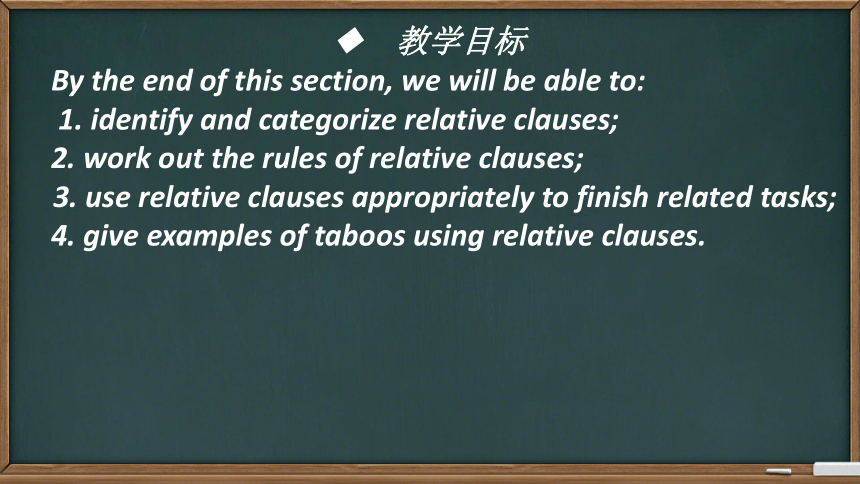
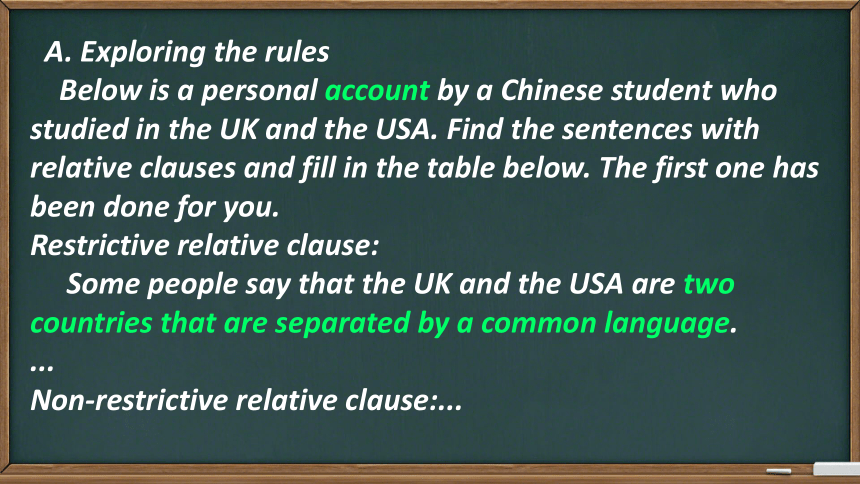
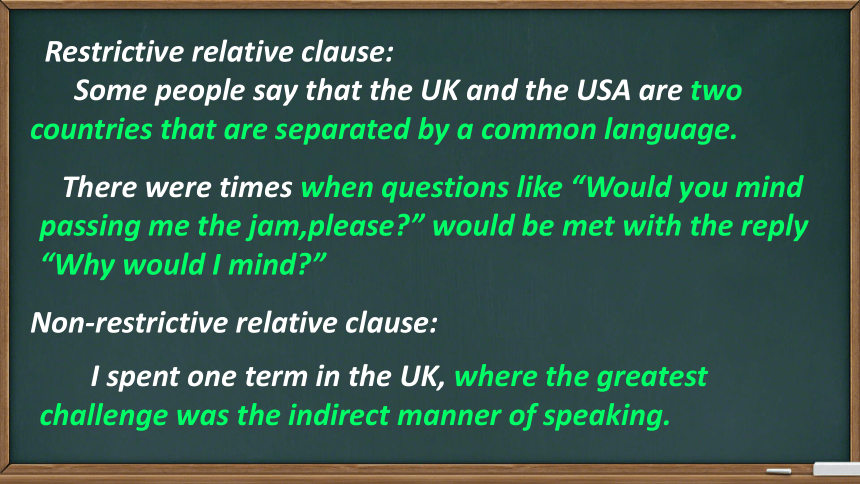
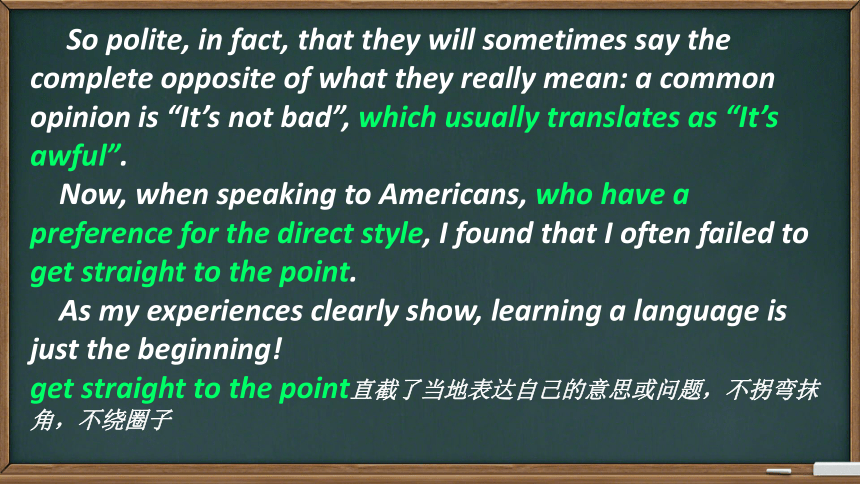
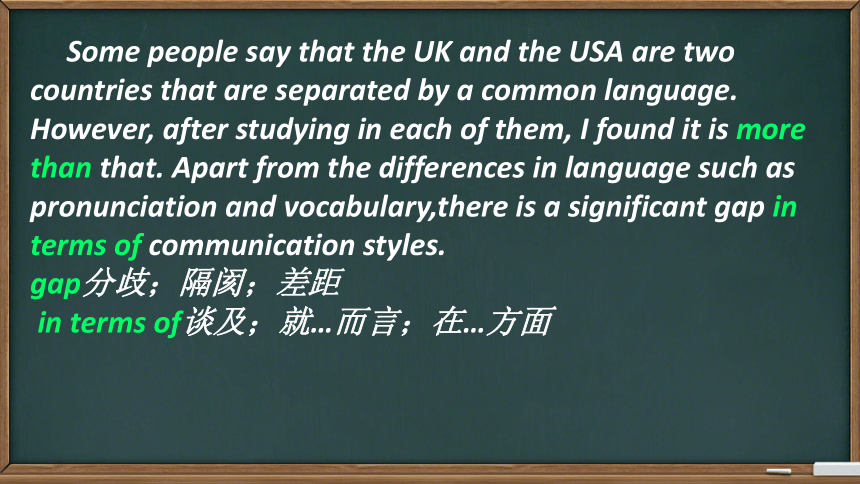
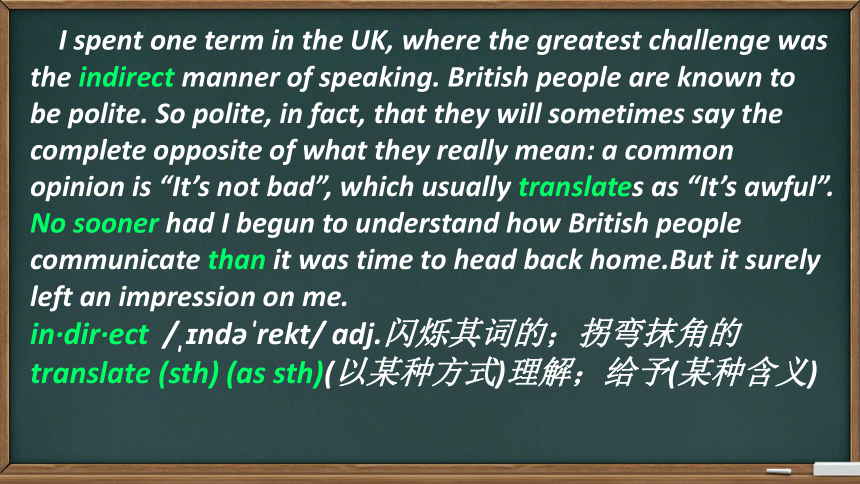
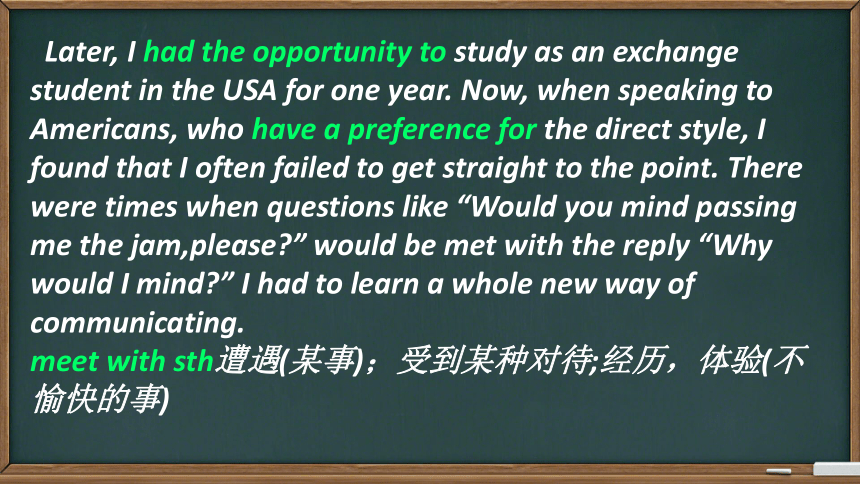
文档简介
(共28张PPT)
牛津译林版高中英语选择性必修四课件
Unit 2 Understanding each other
Grammar and usage Page 20-21
Overview of relative clauses
◆ 内容分析
本板块围绕单元话题,以一位先后留学英美的中国学生撰写的个人自述创设情境,引导我们在语篇中复习、巩固定语从句的核心规则;再通过句子、语篇两个层面的练习内化新知;最后运用所学,准确、恰当、得体地使用目标语法,举例说明其他的文化禁忌,使语法知识的运用和话题意义相结合,实现“形式—意义—使用”三者的统一。
◆ 教学目标
By the end of this section, we will be able to:
1. identify and categorize relative clauses;
2. work out the rules of relative clauses;
3. use relative clauses appropriately to finish related tasks;
4. give examples of taboos using relative clauses.
A. Exploring the rules
Below is a personal account by a Chinese student who studied in the UK and the USA. Find the sentences with relative clauses and fill in the table below. The first one has been done for you.
Restrictive relative clause:
Some people say that the UK and the USA are two countries that are separated by a common language.
...
Non-restrictive relative clause:...
Restrictive relative clause:
Some people say that the UK and the USA are two countries that are separated by a common language.
Non-restrictive relative clause:
There were times when questions like “Would you mind passing me the jam,please ” would be met with the reply “Why would I mind ”
I spent one term in the UK, where the greatest challenge was the indirect manner of speaking.
So polite, in fact, that they will sometimes say the complete opposite of what they really mean: a common opinion is “It’s not bad”, which usually translates as “It’s awful”.
Now, when speaking to Americans, who have a preference for the direct style, I found that I often failed to get straight to the point.
As my experiences clearly show, learning a language is just the beginning!
get straight to the point直截了当地表达自己的意思或问题,不拐弯抹角,不绕圈子
Some people say that the UK and the USA are two countries that are separated by a common language. However, after studying in each of them, I found it is more than that. Apart from the differences in language such as pronunciation and vocabulary,there is a significant gap in terms of communication styles.
gap分歧;隔阂;差距
in terms of谈及;就…而言;在…方面
I spent one term in the UK, where the greatest challenge was the indirect manner of speaking. British people are known to be polite. So polite, in fact, that they will sometimes say the complete opposite of what they really mean: a common opinion is “It’s not bad”, which usually translates as “It’s awful”. No sooner had I begun to understand how British people communicate than it was time to head back home.But it surely left an impression on me.
in·dir·ect / nd rekt/ adj.闪烁其词的;拐弯抹角的
translate (sth) (as sth)(以某种方式)理解;给予(某种含义)
Later, I had the opportunity to study as an exchange student in the USA for one year. Now, when speaking to Americans, who have a preference for the direct style, I found that I often failed to get straight to the point. There were times when questions like “Would you mind passing me the jam,please ” would be met with the reply “Why would I mind ” I had to learn a whole new way of communicating.
meet with sth遭遇(某事);受到某种对待;经历,体验(不愉快的事)
By the end of the exchange year, I had a somewhat better understanding of how to communicate in both countries, but I still have a lot to master. As my experiences
clearly show, learning a language is just the beginning!
Working out the rules:
A restrictive relative clause is used to modify a noun, pronoun or noun phrase and gives (1) _________(necessary
/additional) information about it. For the clause, there is no comma before it.
A non-restrictive relative clause gives (2) __________
(necessary/additional) information about a noun, pronoun or noun phrase in the sentence, or the main clause. We cannot use (3) ______ (that/which) to introduce it.
necessary
additional
that
定语从句复习
定语从句有两种,即限制性定语从句和非限制性定语从句。
1.限制性定语从句对先行项进行限定或修饰,由关系代词或关系副词引导。主句和从句不用逗号隔开。
(1) 关系代词在从句中通常用作主语、宾语、表语或定语,关系副词在从句中通常用作状语。如:
Mike is one of those who love nature.
Can you think of a situation where this word can be used
(2) 当先行项是 way 且在从句中表示“以……的方式”时,常由 in which 或 that 引导定语从句,引导词也可以省略。如:
I like the way (in which/that) you smile.
(3) 由关系代词 whose 引导的定语从句,其先行项可以指人,也可以指物,whose 在从句中充当定语。如:
I have a good friend whose mother is a nurse.
I’d like to live in a room whose window faces south.
(4) 关系副词 when、where、why 有时可以用“介词 + 关系代词”替换。如:
They fixed a date when/on which they would meet again.
I will visit the museum where/in which new robots are exhibited. / ɡ z b t/
Can you tell me the reason why/for which you were late for school yesterday
2.非限制性定语从句对先行项进行补充说明,由关系代词或关系副词引导。主句和从句用逗号隔开。
(1) 非限制性定语从句通常由 which、who 等关系代词或 when、where 等关系副词引导,一般不用 that 引导。如:
This is my favourite song, which I first heard ten years ago.
Let’s put off our appointment until next Monday, when we will be available.
(2) which 引导非限制性定语从句,对整个主句或部分内容进行补充说明。which可充当抽象名词的限定词。如:
Jenny said she could finish the project within two weeks, which I doubt very much.
Betty spent one year in Beijing, during which time she picked up some Chinese.
(3) 非限制性定语从句有时也可以由 as 引导,意为“正如”。由 as 引导的定语从句可以置于句首、句中或句尾。如:
As anybody can see, Nanjing is a beautiful city.
pick sth up(偶然)得到,听到,学会
B. Applying the rules Page 21
B1. Fill in the blanks with proper relative pronouns, relative adverbs or “preposition + relative pronoun” structures.
1.In the UK, ______ punctuality is very important, you should try not to arrive late.
2.In Thailand, the foot, _______ is considered an unclean part of the body, should not be pointed towards another person.
punctuality/ p kt l t /准时性
where
which
3.In Europe, there are many different types of greetings,
________ cheek kissing is just one example, and it is important to know which one to use.
4.When we travel, we should pay attention to situations _______________ there might be unwritten rules, such as gift giving.
5.My sister, ______ works in Japan, finds it odd that she has to do exercise at the start of her working day/workday.
un·writ·ten law, rule, agreement, etc / n r tn/ 非书面的,不成文的,惯常的(法律、规定、协议等);未写的;未写完的
of which
where/in which
who
B2. The passage below is about plete it with the correct relative clauses in the box below. There are two clauses you do NOT need to use. Write the letters in the blanks.
a. few of which are universal
b. that was not tolerated before
c. who see someone breaking a taboo
d. which may seem unimportant to us
e. who break taboos
f. which means “to separate”
g. that make up part of a country’s cultural identity
A taboo is social behaviour that is not allowed. There are many different taboos around the world, (1) ____________
_________________. They often vary from society to society.Taboos are usually related to certain items or people. Those (2) __________________ are likely to feel upset or embarrassed even if they have no intention of hurting others,and the situation will also be awkward for the people around them.
a. few of which are universal
e. who break taboos
When you meet people from different cultures, it is important to understand what you cannot do. If you are not aware of the differences, (3) ______________________
_________________, some strange things might happen. For example, in China, giving an umbrella as a gift to your friend or a married couple, except when it is actually raining, should be avoided. This is because the word that corresponds to “umbrella” in Chinese sounds like another Chinese word (4) __________________________.
d. which may seem unimportant to us
f. which means “to separate”
Before you travel to a new country, it is a good idea to find out about the local taboos. If you know what to avoid and how to behave, you will spare yourself embarrassment. Mind that taboos change with the times. Some behaviour
(5) _____________________________ might be accepted now.
spare sb/yourself (from) sth省得;免去
mind当心;注意
b. that was not tolerated before
B3. What other taboos do you know about Give examples using relative clauses. Use the examples below to help you.
Examples:
In China, people usually avoid the number 4, because its pronunciation is similar to that of a Chinese word which means “to die”.
Aunt Mary, who lives in India, told me that shaking hands or giving someone something with the left hand is a taboo there.
In Japan, bathroom slippers, which are considered dirty, should always remain in the bathroom only and not be worn in any other room of the house.
In Vietnam, people who touch someone’s head or shoulders or pass items over someone’s head are probably not familiar with Vietnamese customs.
slip·per / sl p (r)/ 室内便鞋;拖鞋
Vietnam/ vi et nɑ m/越南
Vietnamese/ vj tn mi z/越南的; 越南人的; 越南语的; 越南人
In Brazil, where purple is usually worn to a funeral or to mourn the loss of a loved one, most people avoid wearing purple because it is believed to be disrespectful and unlucky.
pur·ple / p pl/ 紫色衣服(或料子);紫色的
C. Fill in the blanks with proper relative pronouns, relative adverbs or “preposition + relative pronoun” structures where necessary. Page 64
1. We will develop elderly care programs and services, and provide better services for elderly people _________ live alone.
2. What really puzzled me was not the problem itself, but the way ______________ it was put forward.
who/that
(in which/that)
3. The reason __________________ some students failed the test is that they were not well prepared.
4. New students need to learn about the school rules,
_______ is common practice in many places.
5. It looks as if it is going to rain. I need to rush to the classrooms ______ windows are open.
6. If you are not sure how to write an argumentative essay, you can refer to the third chapter of the writing book, ______________ this issue is addressed.
ar·gu·men·ta·tive/ ɑ ɡju ment t v/ 好争论的;爱辩论的
why/for which/that
which
whose
where/in which
7. John is my best friend and he is one of the people _______________ I have complete confidence in.
8. We arrived home three hours later, ______ the snow had come to a stop.
9. ____ you can see, we can look at a problem from different angles.
10. The book discusses the extent _________ people’s lives have changed over the past 20 years.
who/whom/that
when
As
to which
牛津译林版高中英语选择性必修四课件
Unit 2 Understanding each other
Grammar and usage Page 20-21
Overview of relative clauses
◆ 内容分析
本板块围绕单元话题,以一位先后留学英美的中国学生撰写的个人自述创设情境,引导我们在语篇中复习、巩固定语从句的核心规则;再通过句子、语篇两个层面的练习内化新知;最后运用所学,准确、恰当、得体地使用目标语法,举例说明其他的文化禁忌,使语法知识的运用和话题意义相结合,实现“形式—意义—使用”三者的统一。
◆ 教学目标
By the end of this section, we will be able to:
1. identify and categorize relative clauses;
2. work out the rules of relative clauses;
3. use relative clauses appropriately to finish related tasks;
4. give examples of taboos using relative clauses.
A. Exploring the rules
Below is a personal account by a Chinese student who studied in the UK and the USA. Find the sentences with relative clauses and fill in the table below. The first one has been done for you.
Restrictive relative clause:
Some people say that the UK and the USA are two countries that are separated by a common language.
...
Non-restrictive relative clause:...
Restrictive relative clause:
Some people say that the UK and the USA are two countries that are separated by a common language.
Non-restrictive relative clause:
There were times when questions like “Would you mind passing me the jam,please ” would be met with the reply “Why would I mind ”
I spent one term in the UK, where the greatest challenge was the indirect manner of speaking.
So polite, in fact, that they will sometimes say the complete opposite of what they really mean: a common opinion is “It’s not bad”, which usually translates as “It’s awful”.
Now, when speaking to Americans, who have a preference for the direct style, I found that I often failed to get straight to the point.
As my experiences clearly show, learning a language is just the beginning!
get straight to the point直截了当地表达自己的意思或问题,不拐弯抹角,不绕圈子
Some people say that the UK and the USA are two countries that are separated by a common language. However, after studying in each of them, I found it is more than that. Apart from the differences in language such as pronunciation and vocabulary,there is a significant gap in terms of communication styles.
gap分歧;隔阂;差距
in terms of谈及;就…而言;在…方面
I spent one term in the UK, where the greatest challenge was the indirect manner of speaking. British people are known to be polite. So polite, in fact, that they will sometimes say the complete opposite of what they really mean: a common opinion is “It’s not bad”, which usually translates as “It’s awful”. No sooner had I begun to understand how British people communicate than it was time to head back home.But it surely left an impression on me.
in·dir·ect / nd rekt/ adj.闪烁其词的;拐弯抹角的
translate (sth) (as sth)(以某种方式)理解;给予(某种含义)
Later, I had the opportunity to study as an exchange student in the USA for one year. Now, when speaking to Americans, who have a preference for the direct style, I found that I often failed to get straight to the point. There were times when questions like “Would you mind passing me the jam,please ” would be met with the reply “Why would I mind ” I had to learn a whole new way of communicating.
meet with sth遭遇(某事);受到某种对待;经历,体验(不愉快的事)
By the end of the exchange year, I had a somewhat better understanding of how to communicate in both countries, but I still have a lot to master. As my experiences
clearly show, learning a language is just the beginning!
Working out the rules:
A restrictive relative clause is used to modify a noun, pronoun or noun phrase and gives (1) _________(necessary
/additional) information about it. For the clause, there is no comma before it.
A non-restrictive relative clause gives (2) __________
(necessary/additional) information about a noun, pronoun or noun phrase in the sentence, or the main clause. We cannot use (3) ______ (that/which) to introduce it.
necessary
additional
that
定语从句复习
定语从句有两种,即限制性定语从句和非限制性定语从句。
1.限制性定语从句对先行项进行限定或修饰,由关系代词或关系副词引导。主句和从句不用逗号隔开。
(1) 关系代词在从句中通常用作主语、宾语、表语或定语,关系副词在从句中通常用作状语。如:
Mike is one of those who love nature.
Can you think of a situation where this word can be used
(2) 当先行项是 way 且在从句中表示“以……的方式”时,常由 in which 或 that 引导定语从句,引导词也可以省略。如:
I like the way (in which/that) you smile.
(3) 由关系代词 whose 引导的定语从句,其先行项可以指人,也可以指物,whose 在从句中充当定语。如:
I have a good friend whose mother is a nurse.
I’d like to live in a room whose window faces south.
(4) 关系副词 when、where、why 有时可以用“介词 + 关系代词”替换。如:
They fixed a date when/on which they would meet again.
I will visit the museum where/in which new robots are exhibited. / ɡ z b t/
Can you tell me the reason why/for which you were late for school yesterday
2.非限制性定语从句对先行项进行补充说明,由关系代词或关系副词引导。主句和从句用逗号隔开。
(1) 非限制性定语从句通常由 which、who 等关系代词或 when、where 等关系副词引导,一般不用 that 引导。如:
This is my favourite song, which I first heard ten years ago.
Let’s put off our appointment until next Monday, when we will be available.
(2) which 引导非限制性定语从句,对整个主句或部分内容进行补充说明。which可充当抽象名词的限定词。如:
Jenny said she could finish the project within two weeks, which I doubt very much.
Betty spent one year in Beijing, during which time she picked up some Chinese.
(3) 非限制性定语从句有时也可以由 as 引导,意为“正如”。由 as 引导的定语从句可以置于句首、句中或句尾。如:
As anybody can see, Nanjing is a beautiful city.
pick sth up(偶然)得到,听到,学会
B. Applying the rules Page 21
B1. Fill in the blanks with proper relative pronouns, relative adverbs or “preposition + relative pronoun” structures.
1.In the UK, ______ punctuality is very important, you should try not to arrive late.
2.In Thailand, the foot, _______ is considered an unclean part of the body, should not be pointed towards another person.
punctuality/ p kt l t /准时性
where
which
3.In Europe, there are many different types of greetings,
________ cheek kissing is just one example, and it is important to know which one to use.
4.When we travel, we should pay attention to situations _______________ there might be unwritten rules, such as gift giving.
5.My sister, ______ works in Japan, finds it odd that she has to do exercise at the start of her working day/workday.
un·writ·ten law, rule, agreement, etc / n r tn/ 非书面的,不成文的,惯常的(法律、规定、协议等);未写的;未写完的
of which
where/in which
who
B2. The passage below is about plete it with the correct relative clauses in the box below. There are two clauses you do NOT need to use. Write the letters in the blanks.
a. few of which are universal
b. that was not tolerated before
c. who see someone breaking a taboo
d. which may seem unimportant to us
e. who break taboos
f. which means “to separate”
g. that make up part of a country’s cultural identity
A taboo is social behaviour that is not allowed. There are many different taboos around the world, (1) ____________
_________________. They often vary from society to society.Taboos are usually related to certain items or people. Those (2) __________________ are likely to feel upset or embarrassed even if they have no intention of hurting others,and the situation will also be awkward for the people around them.
a. few of which are universal
e. who break taboos
When you meet people from different cultures, it is important to understand what you cannot do. If you are not aware of the differences, (3) ______________________
_________________, some strange things might happen. For example, in China, giving an umbrella as a gift to your friend or a married couple, except when it is actually raining, should be avoided. This is because the word that corresponds to “umbrella” in Chinese sounds like another Chinese word (4) __________________________.
d. which may seem unimportant to us
f. which means “to separate”
Before you travel to a new country, it is a good idea to find out about the local taboos. If you know what to avoid and how to behave, you will spare yourself embarrassment. Mind that taboos change with the times. Some behaviour
(5) _____________________________ might be accepted now.
spare sb/yourself (from) sth省得;免去
mind当心;注意
b. that was not tolerated before
B3. What other taboos do you know about Give examples using relative clauses. Use the examples below to help you.
Examples:
In China, people usually avoid the number 4, because its pronunciation is similar to that of a Chinese word which means “to die”.
Aunt Mary, who lives in India, told me that shaking hands or giving someone something with the left hand is a taboo there.
In Japan, bathroom slippers, which are considered dirty, should always remain in the bathroom only and not be worn in any other room of the house.
In Vietnam, people who touch someone’s head or shoulders or pass items over someone’s head are probably not familiar with Vietnamese customs.
slip·per / sl p (r)/ 室内便鞋;拖鞋
Vietnam/ vi et nɑ m/越南
Vietnamese/ vj tn mi z/越南的; 越南人的; 越南语的; 越南人
In Brazil, where purple is usually worn to a funeral or to mourn the loss of a loved one, most people avoid wearing purple because it is believed to be disrespectful and unlucky.
pur·ple / p pl/ 紫色衣服(或料子);紫色的
C. Fill in the blanks with proper relative pronouns, relative adverbs or “preposition + relative pronoun” structures where necessary. Page 64
1. We will develop elderly care programs and services, and provide better services for elderly people _________ live alone.
2. What really puzzled me was not the problem itself, but the way ______________ it was put forward.
who/that
(in which/that)
3. The reason __________________ some students failed the test is that they were not well prepared.
4. New students need to learn about the school rules,
_______ is common practice in many places.
5. It looks as if it is going to rain. I need to rush to the classrooms ______ windows are open.
6. If you are not sure how to write an argumentative essay, you can refer to the third chapter of the writing book, ______________ this issue is addressed.
ar·gu·men·ta·tive/ ɑ ɡju ment t v/ 好争论的;爱辩论的
why/for which/that
which
whose
where/in which
7. John is my best friend and he is one of the people _______________ I have complete confidence in.
8. We arrived home three hours later, ______ the snow had come to a stop.
9. ____ you can see, we can look at a problem from different angles.
10. The book discusses the extent _________ people’s lives have changed over the past 20 years.
who/whom/that
when
As
to which
同课章节目录
